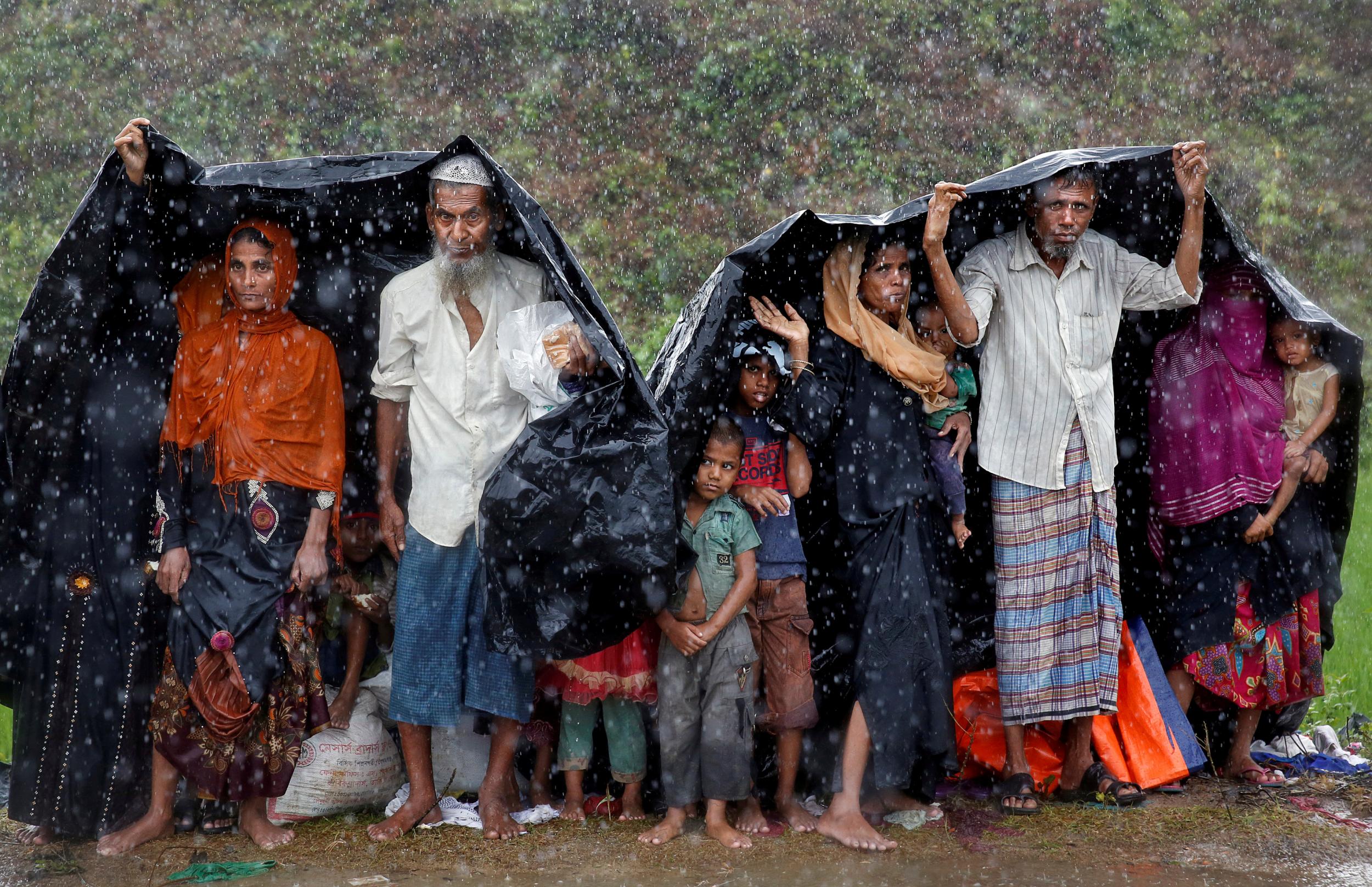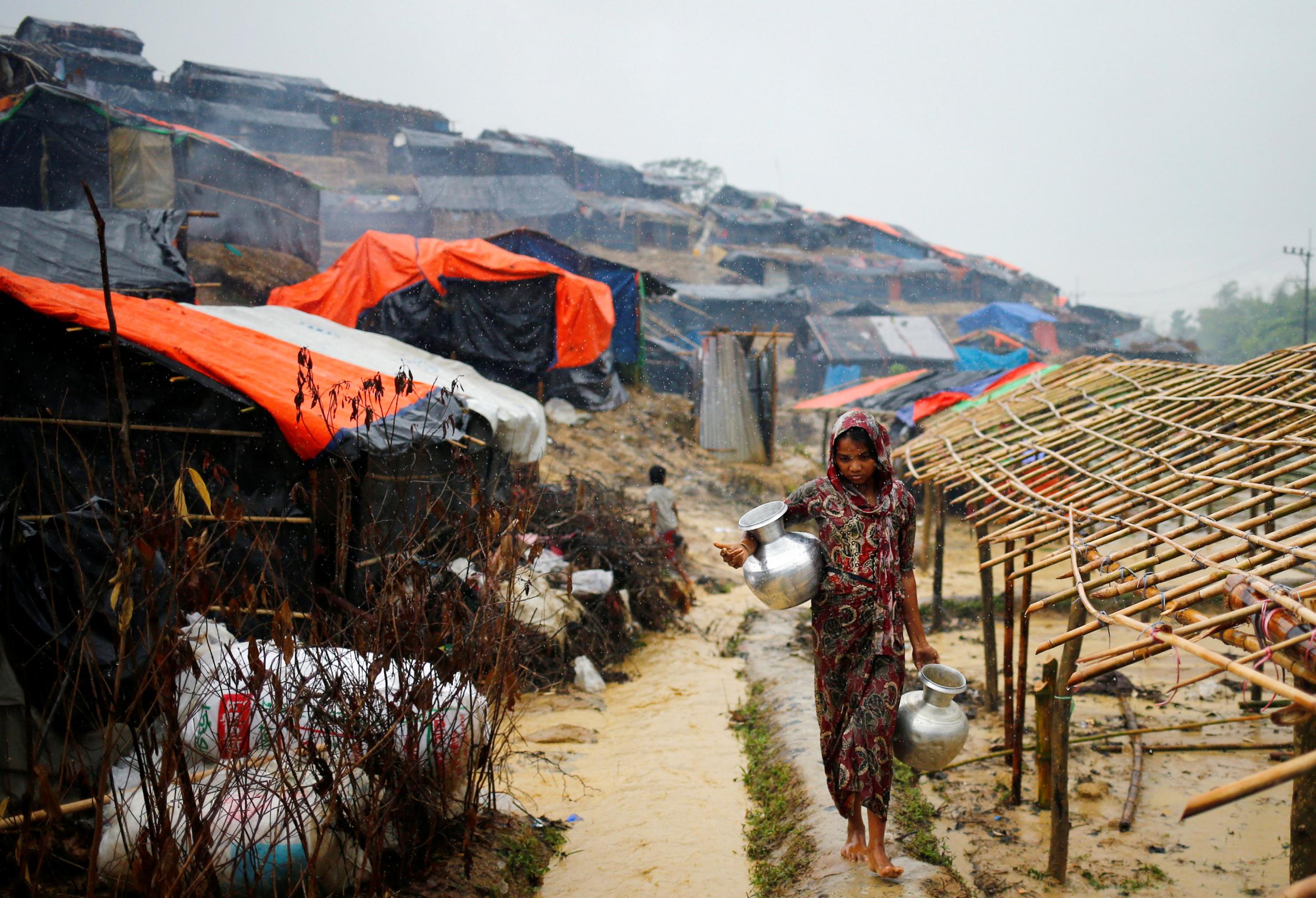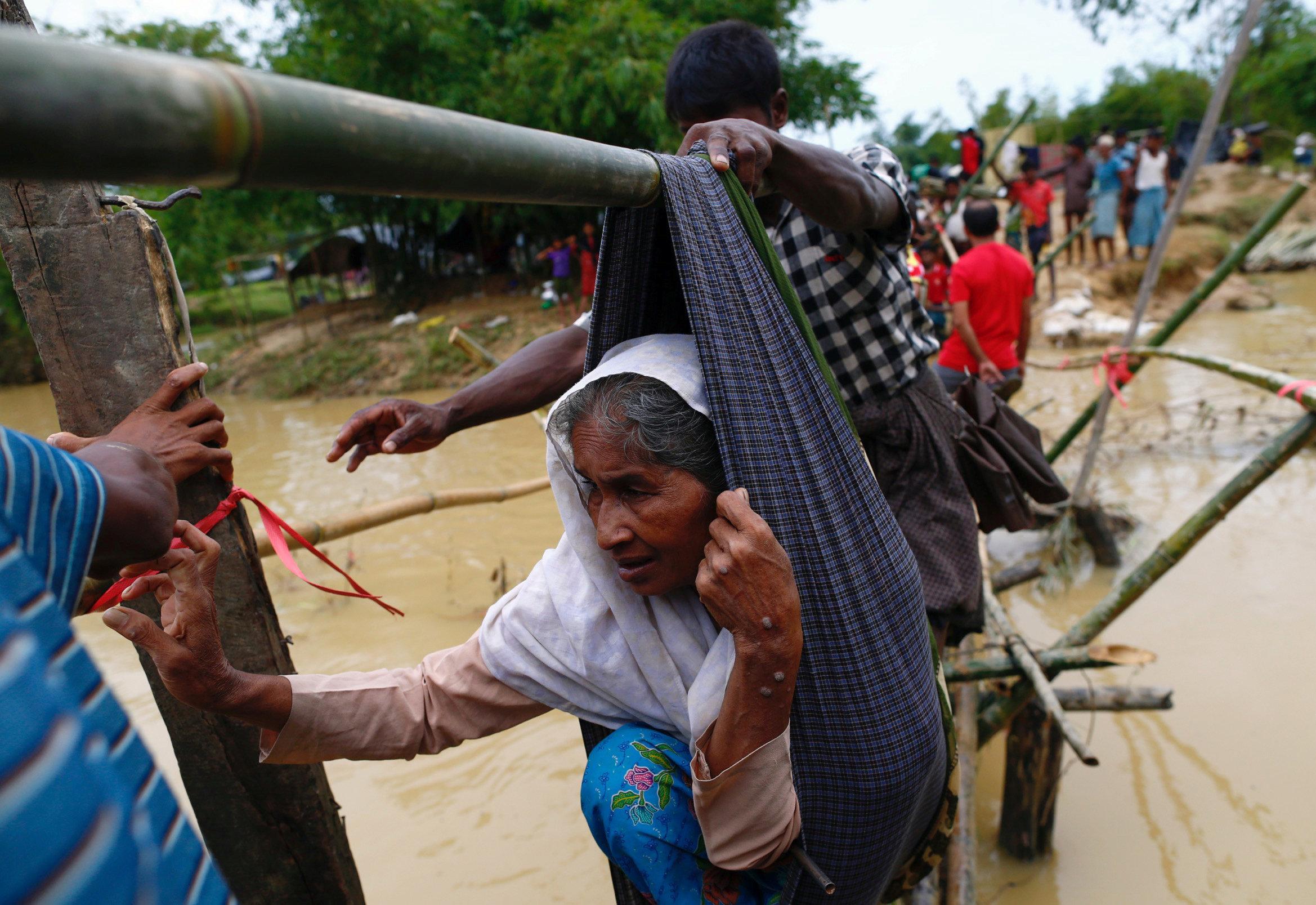Burma: Buddhists tell Rohingya Muslims 'leave or we will kill you all', refugees pleading for safe passage say
Encircled villagers say they will starve to death unless they are given safe passage to flee

Your support helps us to tell the story
From reproductive rights to climate change to Big Tech, The Independent is on the ground when the story is developing. Whether it's investigating the financials of Elon Musk's pro-Trump PAC or producing our latest documentary, 'The A Word', which shines a light on the American women fighting for reproductive rights, we know how important it is to parse out the facts from the messaging.
At such a critical moment in US history, we need reporters on the ground. Your donation allows us to keep sending journalists to speak to both sides of the story.
The Independent is trusted by Americans across the entire political spectrum. And unlike many other quality news outlets, we choose not to lock Americans out of our reporting and analysis with paywalls. We believe quality journalism should be available to everyone, paid for by those who can afford it.
Your support makes all the difference.Thousands of Rohingya Muslims have pleaded for safe passage from two remote Burmese villages cut off by hostile Buddhists and running short of food.
Villagers feared their houses would be burned down and said they could starve to death unless authorities helped them flee.
At least 430,000 Rohingya have escaped into neighbouring Bangladesh amid a campaign of violent persecution that United Nations has called a "textbook example of ethnic cleansing".
"We're terrified," Maung Maung, a Rohingya official at Ah Nauk Pyin village, told Reuters by telephone. "We'll starve soon and they're threatening to burn down our houses."
Another Rohingya Muslim, who asked not to be named, said ethnic Rakhine Buddhists came to the same village and shouted: "Leave or we will kill you all."
Fragile relations between Ah Nauk Pyin and its neighbours were shattered on 25 August, when deadly attacks by Rohingya militants in the western Rakhine state prompted a ferocious response from Burmese security forces.
About a million Rohingya lived in the state until the crisis but endure systematic discrimination in a country where many Buddhists regard them as illegal immigrants from Bangladesh. Most of the Muslim minority face draconian travel restrictions and are denied citizenship.
Tin Maung Swe, secretary of the the state's government, said he had received no information about the plea for safe passage and claimed southern Rathedaung, the district in which the villages sit, was "completely safe".
"There is nothing to be concerned about," he added.
National police spokesman Myo Thu Soe also denied knowledge of the trapped Rohingya villagers but said he would investigate.
The US State Department's East Asia Bureau called "urgently" for Burma's security forces "to act in accordance with the rule of law and to stop the violence and displacement suffered by individuals from all communities."
"Tens of thousands of people reportedly lack adequate food, water, and shelter in northern Rakhine state," spokeswoman Katina Adams said.
"The government should act immediately to assist them."
She added that Patrick Murphy, the US deputy assistant secretary of state for East Asia, would reiterate grave concern about the situation in Rakhine when he meets senior officials in Burma this week.
The UK was set to host a ministerial meeting to discuss the crisis in Rakhine on Monday on the sidelines of the annual UN General Assembly in New York.

Until three weeks ago, there were 21 Muslim villages in Rathedaung, along with three camps for Muslims displaced by previous bouts of religious violence. Sixteen of those villages and all three camps have since been emptied and in many cases burnt, forcing an estimated 28,000 Rohingya to flee.
Rathedaung's five surviving Rohingya villages and their 8,000 or so inhabitants are encircled by Rakhine Buddhists, human rights monitors have said.
The situation is particularly dire in Ah Nauk Pyin and nearby Naung Pin Gyi, where any escape route to Bangladesh is long, arduous, and sometimes blocked by hostile Rakhine neighbours.
Maung Maung, the Rohingya official, said the villagers were resigned to leaving but had no boats to escape and authorities have not responded to their requests for security.
"It's better they go somewhere else," said Thein Aung, a Rathedaung official, who dismissed allegations that Rakhines were threatening Rohingya.
Two of the 25 August attacks by the Arakan Rohingya Salvation Army (ARSA) took place in Rathedaung. But the township was already a tinderbox of religious tension, with ARSA citing the mistreatment of Rohingya there as one justification for its offensive.
In late July, Rakhine residents of a large, mixed village in northern Rathedaung enclosed hundreds of Rohingya inside their neighbourhood and blocked access to food and water.
Maung Maung said he had called the police at least 30 times to report threats against his village.
In one 13 September phone call, heard in a recording passed to Reuters, a man told him: "Leave tomorrow or we'll come and burn down all your houses."
When Maung Maung protested that they had no means to escape, the man replied: "That's not our problem."
On 31 August, the police convened a roadside meeting between seven Rohingya from Ah Nauk Pyin and 14 Rakhine officials from the surrounding villages.
Instead of addressing Rohingya complaints the Rakhine officials delivered an ultimatum, according to Maung Maung and two other Rohingya who attended the meeting,
"They said they didn't want any Muslims in the region and we should leave immediately," said a Rohingya resident of Ah Nauk Pyin who requested anonymity.
The Rohingya agreed, but only if the authorities provided security, said Maung Maung.
He showed Reuters a letter that village elders had sent to the Rathedaung authorities on 7 September, asking to be moved to "another place". They had yet to receive a response, he said.

Relations between the two communities deteriorated in 2012, when religious unrest in Rakhine state killed nearly 200 people and made 140,000 homeless, most of them Rohingya. Scores of houses in Ah Nauk Pyin were torched.
Since then, said villagers, Rohingya have been too scared to leave the village or till their land, surviving mainly on monthly deliveries from the World Food Programme (WFP).
The recent violence halted those deliveries as the WFP pulled out most staff and suspended operations in the region.
Residents in the area's two Rohingya villages said they could no longer venture out to fish or buy food from Rakhine traders, and were running low on food and medicines.
Maung Maung said the local police told the Rohingya to stay in their villages and not to worry because "nothing would happen".
But the nearest police station has about six officers and could not do much if Ah Nauk Pyin was attacked, he said.
A few minutes' walk away, at the Rakhine village of Shwe Long Tin, residents were also on edge, said its leader Khin Tun Aye.
Villagers heard gunfire at night and were guarding the village around the clock with machetes and slingshots in case it was attacked by the ARSA.
"We're also terrified," he said.
He added he had told his fellow Rakhine to stay calm, but the situation remained so tense that he feared for the safety of his Rohingya neighbours.
Rohingya who have fled Burma also face a growing humanitarian crisis, with aid agencies warning of shortages of food, water, and shelter in Bangladeshi refugee camps.
A woman and two children were reportedly killed in a stampede on Sunday as food and clothing were thrown from relief trucks.
UN Secretary-General on Sunday added to growing pressure on Burmese leader Aung San Suu Kyi to do more to stop end the military crackdown on the Rohingya.
“I would expect that the leader of the country would be able to contain it, and would be able to reverse the situation,” Antonio Guterres said in a BBC interview.
“She has a chance, she has a last chance in my opinion, to do so.”
Otherwise, he said, “the tragedy will be absolutely horrible.”
Additional reporting by agencies
Subscribe to Independent Premium to bookmark this article
Want to bookmark your favourite articles and stories to read or reference later? Start your Independent Premium subscription today.
Join our commenting forum
Join thought-provoking conversations, follow other Independent readers and see their replies
Comments